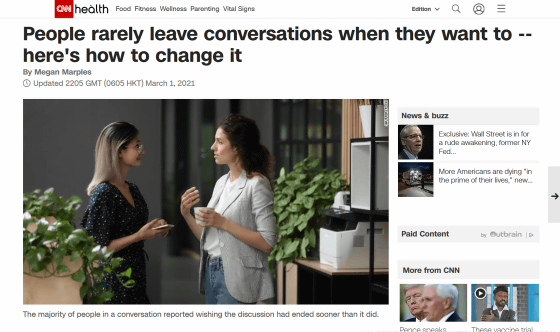Research shows that 98% of conversations do not end at the timing they both want

There are many experiences where the conversation did not end at the ideal timing, such as 'If you start a conversation with the intention of a light standing talk, the other person will not finish the conversation easily' 'I wanted to talk more but the other person stopped the conversation' Should have this person. A study published by teams from Harvard University and the University of Pennsylvania found that less than 2% of conversations ended at the desired time for both parties, and that 98% of conversations did not end at a time they were satisfied with. ..
Do conversations end when people want them to? | PNAS
Only 2% of conversations end when we want them to – here's why that's cause for celebration
https://theconversation.com/only-2-of-conversations-end-when-we-want-them-to-heres-why-thats-cause-for-celebration-156231
Conversations rarely end when you want them to, study finds --CNN
https://edition.cnn.com/2021/03/01/health/conversation-ending-study-wellness/index.html

Social connections through conversation are an important means of providing physical and mental well-being, but we do not know the details of how conversation begins and ends. So, a research team led by Adam Mastroianni, a PhD student at Harvard University, to look at the difference between 'the length of the conversation that actually took place' and 'the length of the conversation that people really wanted.' We conducted two surveys.
In the first survey, 806 subjects were asked to recall 'recent conversations' and to answer their feelings at that time and when the conversation ended. Eighty percent of the conversations remembered by the subjects were with intimate people such as lovers, friends, or family members, but nearly 66% of the subjects passed the point where they 'should end the conversation here.' He answered that the conversation had continued.
The research team also found that subjects whose conversations continued beyond their ideal timing did not enjoy the conversation more than subjects who ended the conversation when they wanted to. Stated.

In the second survey, 252 subjects were invited to the laboratory to form pairs and have conversations with 'people who do not know each other.' In this experiment, the two were asked to continue the conversation between 1 and 45 minutes, and when the conversation was over, they interviewed the subjects to hear about their feelings during the conversation and when they ended the conversation. ..
The results of the interview were almost the same as in the first survey, and more than 68% of the subjects answered that 'there was a timing when they wanted to end the conversation in the middle.' We also found that subjects who had a longer-than-ideal conversation did not enjoy the conversation much compared to other subjects.
Analyzing the results of the two surveys, 98% or more of the conversations surveyed ended conversations at 'at least one of them did not want', and less than 2% of conversations ended at the timing both wanted. It was. This number seems to have been almost consistent, whether the person you were talking to was an intimate relationship or a stranger.

The reason why the conversation does not end at the desired time is that the research team tries to be polite with each other in the conversation and cooperates with each other at the end of the conversation.
Many people unconsciously engage in conversation, but the flow is in line with the 'conversation patterns' they have learned in their lives. The 'conversation patterns' that people follow include 'when the other person speaks to some extent, then I speak' and 'make a preliminary statement before cutting into the main subject'. In the latter case, the flow of asking 'Have you eaten lunch yet?' To finally suggest 'Why don't you have lunch?' Applies. In this way, when each other has a conversation that follows a pattern, the conversation tends to be long.
Mastroianni points out that talking to someone is like driving on the freeway. Just as you may have to overlook the exit on the highway to avoid collisions with other cars or walls, there are many exits to end the conversation, but depending on the flow you have to overlook the clues to end it. It will not be. “We found that the distance to the exit could be very long because we had to wait for it to finish at the right time,” said Mastroianni.
In addition, people engaged in conversation adapt to various reactions such as facial expressions, eyes, body language, and coughing of the other person, and each time they slightly modify the trajectory of the conversation, sometimes they misunderstand the reaction of the other person. It may be overlooked. As a result, there are cases where one tries to end the conversation but the other continues the conversation, or one wants to continue the conversation but the other tries to end the conversation.
The results of this study also seem to highlight the disastrous result that 'the conversation almost never ends ideally.' However, academic media The Conversation said that from a different point of view, 98% of people said that they 'considered how to end the conversation comfortably', suggesting that people are caring for the other person. I did.

Related Posts:
in Note, Posted by log1h_ik







